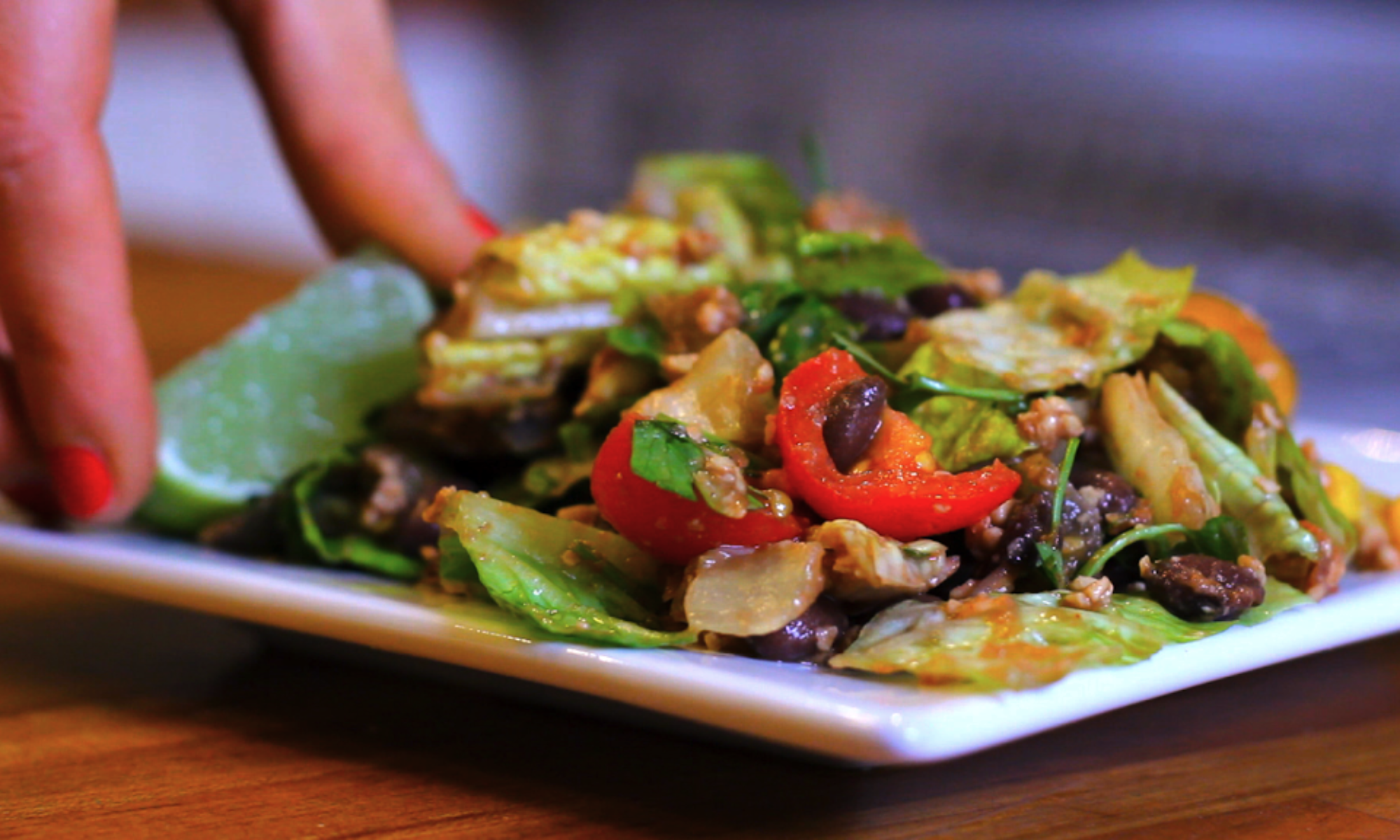
I am so excited to share my third video series with everyone! I chose to focus the series entirely on beans. Why? Because I believe beans address a number of concerns and misconceptions people have about adopting a plant-based diet.
Misconception: “I won’t get enough protein.”
Reality: Beans are a fantastic source of protein. Just one cup of cooked soybeans has 29 grams of protein, one cup of cooked lentils has 18 grams, and 1 cup of cooked black beans has 15 grams. Adult men need about 56 grams of protein per day and adult women need about 46 grams per day. If you make beans a regular part of your diet it would be difficult not to meet these requirements. After all, if you are consuming enough calories, it is almost impossible to be protein deficient. (Note: Not only do most people consume much more protein than they need, they actually consume more protein than is safe. See here.)
Reality: What could possibly be heartier and more filling than beans? Beans are rich in fiber which means they will satisfy hunger and keep you feeling full for hours. (The soluble fiber in beans also helps lower cholesterol and reduces the risk of heart attack and stroke.)
Reality: Do you know how many things you can make with beans? This series barely skims the surface of the options. You can make everything from casseroles to salads to burritos to curries to jambalayas and more. You can even make brownies and blondies from beans! Beans are featured in distinct ways in cuisines all across the globe. Plus, there are many different kinds of beans, from lentils to chickpeas to kidney beans and beyond, each with their own distinct flavors and textures.
Misconception: “It’s too expensive.”
Reality: Nothing is cheaper than beans. If you can afford anything, you can afford beans.
Misconception: “I don’t have time to cook.”
Reality: If you have time to get out your can opener, then you have enough time. All you need to do is open the cans, dump the beans into a bowl, and season. That’s it. If you are feeling extra fancy, you can even heat the beans. Voila! Dinner is served. It would probably take you longer to order and pay for a meal at a drive-thru. (See my recipe for “Incredibly Easy Pumpkin Chili”)
Misconception: “I don’t know how to cook.”
Reality: If you are able to use a can opener, you have what it takes. See above.
Misconception: “I don’t have access to ‘specialty vegan food’ where I live.”
Reality: One of the great things about beans is that they are accessible in all parts of the country, rural and urban alike. They are sold at every grocery store, quickie mart, and even at many gas stations.
Misconception: “I won’t get enough calcium.”
Reality: Beans are loaded with calcium! Although the dairy industry would like people to believe that cow’s milk is the only source of calcium, this simply isn’t true. (And, in fact, the higher a country’s consumption of cow’s milk, the higher their rate of osteoporosis.) Beans also contain magnesium, which the body uses along with calcium to build bones. Physicians Comittee for Responsible Medicine has a useful chart of the calcium and magnesium content in many beans here. In a recent study, researchers found that those who consumed more high-phytate foods (i.e. beans) had stronger bones. The researchers conclude that dietary phytate had protective effects against osteoporosis and that low phytate consumption should be considered an osteoporosis risk factor. (For more information on this study, see here.)
Misconception: “I’m gluten-free/allergic to soy so a plant-based diet would be too restrictive.”
Reality: Beans are gluten-free and there are many other types of beans besides soybeans. Also, see “There’s not enough variety.”
Misconception: “There are too many carbs in a plant-based diet.”
Reality: There is a lot of misinformation out surrounding carbohydrates. Be smarter than the urban myths and don’t get sucked in! Recently, researchers at Harvard looked at the diets of 100,000 people and found that low-carb diets were associated with higher all-cause mortality, higher cardiovascular disease mortality, and higher cancer mortality. True, muffins and donuts and cookies are carbohydrates and if you load up on those it’s quite possible you will gain weight, your blood sugar will spike, etc. However, there is a world of difference between refined carbohydrates and complex carbohydrates, and beans are complex carbohydrates. To avoid complex carbohydrates because they technically fall under the same food group as refined carbohydrates is just silly. It would be like refusing to travel on an airplane because you are against war and in wars they use jet planes.
Beans are truly one of the healthiest foods on the planet and anyone who cares about their health ought to make them a regular part of their diet. A recent international study found that there is an 8% reduction in risk of death for every two tablespoons of daily legume intake. An 8% reduction from just two tablespoons! So, to paraphrase Dr. Michael Gregor of NutritionFacts.org, if you want to increase your lifespan, eat beans. If, however, you’re suicidal and want to decrease your lifespan, enjoy a bean-free diet.
So, in conclusion, when the little voice of doubt creeps into your head, just remember: BEANS. They are health-promoting, filling, protein-rich, fiber-rich, calcium-rich, versatile, simple, cheap, accessible and delicious… what’s not to love?
Further notes:
All the recipes in this series will be gluten-free, oil-free, and as always, 100% plant-based.
For those concerned about gas, know that a) studies have shown that this concern is largely overblown (ahem, excuse the pun) and that b) if you eat beans on a regular basis, your body adjusts and gas stops being an issue. I highly recommend reading this entertaining and informative article by Dr. Michael Gregor of NutritionFacts.org. Also see my past post on how to soak dried beans as soaking beans can ease digestion.
Check out these short but informative videos on the health-promoting benefits of beans:
Increased Lifespan from Beans
Beans, Beans Good for Your Heart
Beans and the Second Meal Effect
Phytates for the Prevention of Osteoporosis
* If you have ever heard that plant proteins need to be combined in specific ways order to be “complete,” rest assured that is an outdated nutritional theory from the 1950’s that is nothing more than a myth.

